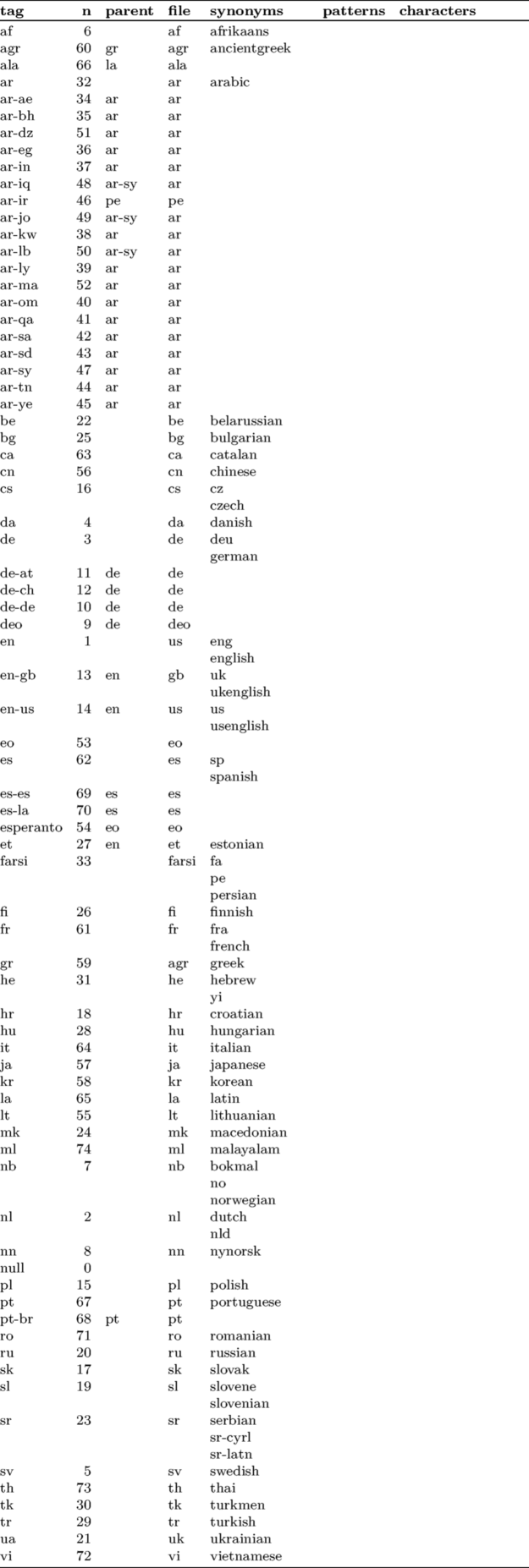Difference between revisions of "Languages"
Jump to navigation
Jump to search
m |
(merge content of Language Codes) |
||
| Line 1: | Line 1: | ||
| − | + | Today, with the international use of the UTF-8 standard for input and output encoding, you only need two commands and the '''language tag''' you want in brackets: | |
* <cmd>mainlanguage</cmd>, to set the language of auto-generated language elements, like the title of the table of contents or the appendix. | * <cmd>mainlanguage</cmd>, to set the language of auto-generated language elements, like the title of the table of contents or the appendix. | ||
* <cmd>language</cmd>, to change the hyphenation rules, quotation marks, all that sort of thing, to that of a different language. (The default language is English.) | * <cmd>language</cmd>, to change the hyphenation rules, quotation marks, all that sort of thing, to that of a different language. (The default language is English.) | ||
| + | = Language tags= | ||
| − | + | Here's the list of ConTeXt's '''language tags''', also available in the [http://www.pragma-ade.com/general/manuals/languages-mkiv.pdf#[5,{%22name%22:%22Fit%22}] latest official Languages manual] (link to the associated [https://source.contextgarden.net/tex/context/patterns sources]). | |
| + | |||
| + | <context source=yes> | ||
| + | \usemodule[languages-system] | ||
| + | \loadinstalledlanguages | ||
| + | \showinstalledlanguages | ||
| + | </context> | ||
| + | |||
| + | = Language specific pages= | ||
* [[Arabic and Hebrew]] | * [[Arabic and Hebrew]] | ||
| Line 16: | Line 25: | ||
Finally, for older content, we keep a page [[Encodings and Regimes - Old Content]] about including accents, composite characters, and how "ä" and alike were produced in LaTeX/ConTeXt mkii. | Finally, for older content, we keep a page [[Encodings and Regimes - Old Content]] about including accents, composite characters, and how "ä" and alike were produced in LaTeX/ConTeXt mkii. | ||
| + | |||
| + | [[Category:International]] | ||
Revision as of 13:17, 7 June 2020
Today, with the international use of the UTF-8 standard for input and output encoding, you only need two commands and the language tag you want in brackets:
- \mainlanguage, to set the language of auto-generated language elements, like the title of the table of contents or the appendix.
- \language, to change the hyphenation rules, quotation marks, all that sort of thing, to that of a different language. (The default language is English.)
Language tags
Here's the list of ConTeXt's language tags, also available in the latest official Languages manual (link to the associated sources).
\usemodule[languages-system] \loadinstalledlanguages \showinstalledlanguages

Language specific pages
- Arabic and Hebrew
- Chinese Japanese and Korean
- Czech
- Greek
- Russian
- Vietnamese
- RTL for dealing with Right-To-Left texts as well as BiDi (bidirectional) texts
Finally, for older content, we keep a page Encodings and Regimes - Old Content about including accents, composite characters, and how "ä" and alike were produced in LaTeX/ConTeXt mkii.